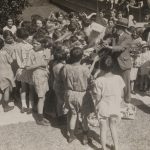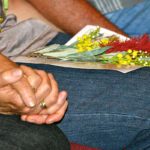Roots
- Jul 29, 2016
- In Uncategorized
On Monday 18 July 2016, the University of Melbourne hosted a workshop related to ‘Routes to the Past’, a project funded by an interdisciplinary seeding grant from the Melbourne Social Equity Institute. The project team for Routes to the Past comprises academic researchers from the University’s eScholarship Research Centre, the School of Historical and Philosophical Studies and the Department of Social Work and representatives of two partner organisations: the Care Leavers Australasia Network (CLAN) and the Dulwich Centre.
Routes to the Past is exploring possibilities for new collaborative approaches to working with Care Leavers, supporting them through the processes of accessing records, discovering their family history and coming to terms with a past in institutional ‘care’. The interdisciplinary project team is considering the potential relevance for Care Leavers of two approaches: narrative practice, and therapeutic life story work. We were fortunate to have experts from each of these fields at the workshop on 18 July: David Denborough of the Dulwich Centre in Adelaide, and Richard Rose, of Child Trauma Intervention Services (UK) and the Berry Street Childhood Institute.
Workshop participants came from organisations supporting Care Leavers (including CLAN, Lotus Place and Open Place), the Department of Health and Human Services, ‘past provider’ organisations with heritage services for Care Leavers (including Berry Street and MacKillop Family Services), and from a range of academic disciplines.
The workshop began with a fascinating and moving presentation by Leonie Sheedy and Frank Golding, giving a Care Leaver perspective on Records, storytelling, trauma and identity. David Denborough’s presentation about narrative practice talked about the storylines that we all create to understand ourselves and our lives. Narrative practice involves looking beyond the dominant story (especially if it’s a negative one) to find others. These alternative stories can be hidden and can start off very frail, but they can be strengthened (or ‘thickened’), thus creating opportunities for new stories.
David’s presentation about alternative stories, double-story development and the possibilities of counter documents resonated powerfully with the earlier presentation from Leonie and Frank, and the work that a range of support services are already doing with Care Leavers. Participants from support services talked about the different types of storytelling they do with Care Leavers, and the ways they help people to contextualise their ‘care’ records in new ways. Leonie remarked that when she is releasing records to someone that show that they ‘absconded’ from a Home, she always says to them ‘You’re my hero! I never had the guts to run away’. David said this was a perfect example of double-story development: challenging the dominant story told by official, institutional records; and telling counter stories that respect and acknowledge the strengths, knowledge and survival skills of the storyteller. David talked about his draft (which will always be a draft) Narrative Justice Charter of Story-telling Rights, which provides a model for storytelling that ‘defends people’s rights to name their own experiences, to define their own problems, and to honour how their skills, abilities, relationships, history and culture can contribute to reclaiming their lives from the effects of trauma’.
Richard Rose’s presentation about therapeutic life story work with children also had many parallels. Richard explained that life story work is about gathering fragments of information from a wide range of sources, and then working with the child and the carer to understand the past, and to explore how the past drives the present. Through the life story work process, the child creates a meaningful story out of the fragments of confusion, chaos and trauma, a story that can enable the child to progress into the future. Many adult Care Leavers seeking out their records and their family histories are looking for this coherence and meaning, for a self-narrative that provides ‘a sense of unity and predictability that allows us to function’ (the quote comes from Lou Harms, a participant at the workshop, and author of Understanding Trauma and Resilience).
In the afternoon, there were group discussions, around 3 topics: Genealogical research for Care Leavers (led by Siobhan McGuinness of Open Place), Turning records into stories (led by Lachlan Douglas of Lotus Place) and Supported release (led by Jenny Glare of MacKillop Family Services). All too soon, it was time for final reflections. Many people who spoke during the workshop mused about the title of the project, and there were lots of interesting ideas and comments about both ‘roots’ and ‘routes’. We spoke about trees, as well.
Developing a family tree is a fundamental part of genealogical practices, but this process can be particularly complex and fraught for many people who were in ‘care’ as children. Another type of tree comes from the field of narrative practice – the Dulwich Centre has developed a methodology called The Tree of Life as an approach to working with children, young people and adults who have experienced hard times.
Richard Rose gave an example of how his work can involve the use of ‘Behaviour Trees’ to understand traumatised young people (in fact, this practice draws on the Tree of Life). Richard’s life story involves the drawing of a tree, with leaves on which different behaviours are named. The leaves are the visible parts of the child, the behaviours that can define how a young person is treated by others. The drawing of the tree also includes its roots, the trauma events from the child’s past. Knowing about and understanding these roots can enable the child and the carer to see ‘that some of the behaviours, feelings and actions are communications from the roots hidden below the ground …’ (see Richard Rose’s book, Life story work with traumatised children, pp.133-134)
The roots provide an explanation for the leaves. Knowing about the roots can enable the carer to understand the child’s behaviour as a coping mechanism for painful things from the past. At the workshop, Richard said that ‘life story work is about making sense of the roots, not the leaves’. As part of the behaviour tree exercise, the carer and the child also draw a trunk, to connect the roots of the tree to the leaves. One child reflecting on the behaviour tree and life story work was quoted in Richard’s 2012 book: ‘So my leaves might grow more healthily and those that are unhelpful and get me into trouble might fall away’.
The Routes to the Past first workshop clearly demonstrated the great potential for a collaboration of approaches to develop new ways to support Care Leavers to come up with new narratives about their lives. The project team will develop a Discussion Paper to share the learnings from the first workshop and from other research and consultations for this project as it progresses – stay tuned.







Frank Golding
July 29, 2016 6:01 pmPredictive text is a nuisance! ‘couple’ should be ‘complex’. Sorry!
Frank Golding
July 29, 2016 6:00 pmA very useful summary of a couple day, Cate. Thanks too for the links to related reading. Much appreciated.